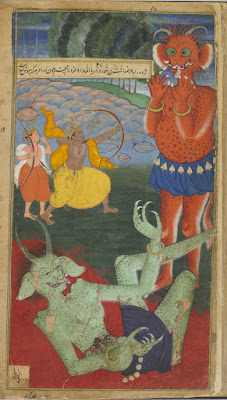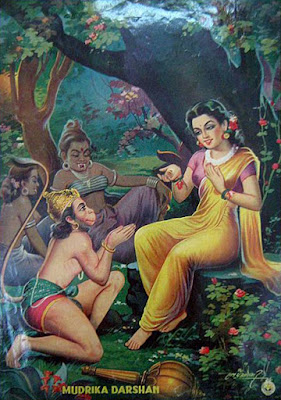Reading Notes: Public Domain Ramayana, Section A
NOTES:
STREAM OF CONSCIOUSNESS:
- So the first story that caught my attention for utilization purposes is PDE Ramayana: Thataka !
- Rama does battle for the first time with a rakashasi (first feminist)
- Described as "misshaped and horrible"
- They didn't want to kill a woman so they just maimed her
- She becomes invisible
- Rama turns his listening ears on and finally kills her
- While celebrating, the son of Thataka, Maricha, goes to avenge his mother
- The second story I found useful was that of Ahalya.
- This "town-destroying" god falls in love with Ahalya
- She knows that it's some other dude
- "love's unholy fire"
- The husband finds out and dooms the god to be "sad and sexless" OUCH!
- He then curses his wife to be invisible (again we see invisibility used as a tool and curse of women)
- Her return to life is dependent on this other fool's entrance into the stupid garden
- AND THEN SHE JUST GETS RETURNED TO THE A$$ THAT MADE HER INVISIBLE
GENDER ROLES:
From what I can see in both stories, males are for sure better than females. Especially this Rama kid. He is defeating and saving women left and right. Everyone's safety and life hangs in the balance of this sweaty teenager. But to the author, this is basically a god among men. Even in the first story, a mother and a strong woman in her community is thwarted by Rama and she doesn't even get an ounce of sympathy. I understand she is a man-eater but come on yall.
From what I can see in both stories, males are for sure better than females. Especially this Rama kid. He is defeating and saving women left and right. Everyone's safety and life hangs in the balance of this sweaty teenager. But to the author, this is basically a god among men. Even in the first story, a mother and a strong woman in her community is thwarted by Rama and she doesn't even get an ounce of sympathy. I understand she is a man-eater but come on yall.
INVISIBILITY:
I find it SUPER interesting that invisibility is used as a tool and punishment for women in both stories. The Rakashasi uses invisibility to try and defend herself against Rama. Ahalya gets turned invisible for years because she was unfaithful to her husband. I find this ironic as women are often invisible in society, so making them invisible in a story wouldn't seem too far off from reality.
I find it SUPER interesting that invisibility is used as a tool and punishment for women in both stories. The Rakashasi uses invisibility to try and defend herself against Rama. Ahalya gets turned invisible for years because she was unfaithful to her husband. I find this ironic as women are often invisible in society, so making them invisible in a story wouldn't seem too far off from reality.
Ahalya, Source : Valmiki's Ramayana - Translated by Ralph T.H. Griffith
Thataka, Source : Indian Myth and Legend - Donald A. Mackenzie



Comments
Post a Comment